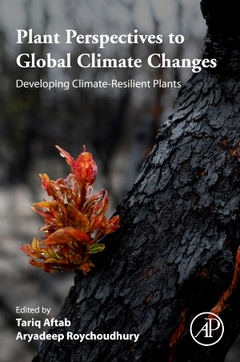L’édition demandée n’est plus disponible, nous vous proposons la dernière édition.
Plant Perspectives to Global Climate Changes Developing Climate-Resilient Plants
Coordonnateurs : Aftab Tariq, Roychoudhury Aryadeep

Plant Perspectives to Global Climate Changes: Developing Climate-Resilient Plants reviews and integrates currently available information on the impact of the environment on functional and adaptive features of plants from the molecular, biochemical and physiological perspectives to the whole plant level. The book also provides a direction towards implementation of programs and practices that will enable sustainable production of crops resilient to climatic alterations. This book will be beneficial to academics and researchers working on stress physiology, stress proteins, genomics, proteomics, genetic engineering, and other fields of plant physiology.
Advancing ecophysiological understanding and approaches to enhance plant responses to new environmental conditions is critical to developing meaningful high-throughput phenotyping tools and maintaining humankind?s supply of goods and services as global climate change intensifies.
1. Climate change impact on plants: Plant responses and adaptations
2. Towards understanding abiotic stress physiological studies in plants: Conjunction of genomic and proteomic approaches
3. Co-overexpression of genes in plants for abiotic stress tolerance
4. Molecular investigation of plant-environment interaction at functional level
5. Physiological, biochemical, and molecular adaptation mechanisms of photosynthesis and respiration under challenging environments
6. Harnessing the potential of modern omics approaches to study plant biotic and abiotic stresses
7. Soil-plant interactions for agricultural sustainability under challenging climate change
8. Biological nitrification inhibition for sustainable crop production
9. Application of nanoparticles in developing resilience against abiotic stress in rice plant (Oryza sativa L.)
10. Physiological mechanisms and adaptation strategies of plants under nutrient deficiency and toxicity conditions
11. Genomics-based approaches to improve abiotic stress tolerance in plants: Present status and future prospects
12. Transcription factors involved in plant responses to heavy metal stress adaptation
13. The role of soil microorganisms in plant adaptation to abiotic stresses: Current scenario and future perspectives
14. Ecological aspects of the soil-water-plant-atmosphere system
15. Role of miRNAi technology and miRNAs in abiotic and biotic stress resilience
16. CRISPR-Cas9-mediated genome editing technology for abiotic stress tolerance in crop plant
17. Reactive oxygen and nitrogen species: Antioxidant defense studies in plants
18. Role of plant hormones in combating biotic stress in plants
19. CRISPR-mediated genome editing for developing climate-resilient monocot and dicot crops
20. Mechanism of temperature stress acclimation and the role of transporters in plants
21. Role of ß-aminobutyric acid in generating stress-tolerant and climate-resilient plants
22. Wild relatives of plants as sources for the development of abiotic stress tolerance in plants
23. Role of magnetopriming in alleviation of abiotic stress in plants
Prof. (Dr.) Aryadeep Roychoudhury is currently serving as Professor in the Discipline of Life Sciences, School of Sciences, Indira Gandhi National Open University (IGNOU), New Delhi. Before joining IGNOU, he worked as Assistant Professor at the Post Graduate Department of Biotechnology, St. Xavier’s College (Autonomous), Kolkata. Prof. Roychoudhury did B.Sc. (Honours) in Botany from Presidency College, Kolkata, and M.Sc. in Biophysics and Molecular Biology from University of Calcutta. He obtained his Ph.D. degree in Science from Bose Institute, Kolkata under Jadavpur University in the area of Plant Molecular Biology and Biotechnology. He has been associated with the molecular regulation of late embryogenesis abundant genes and the basic leucine zipper group of transcription factors, governing salt tolerance in rice. His post doctoral research was based on translational research on transgenic rice with enhanced salt and drought tolerance. His current research interests include physiological and molecular responses and cell signaling of plants during diverse abiotic stresses including fluoride, heavy metals, salinity and
- Illustrates the central role for plant ecophysiology in applying basic research to address current and future challenges for humans
- Brings together global leaders working in the area of plant-environment interactions and shares research findings
- Presents current scenarios and future plans of action for the management of stresses through various approaches
Date de parution : 09-2021
Ouvrage de 556 p.
15.2x22.8 cm
Thème de Plant Perspectives to Global Climate Changes :
Mots-clés :
Abiotic and biotic factors; Abiotic stress; Abiotic stress tolerance; Abiotic stresses; Adaptability; Adaptation strategies; Adverse effects; Antioxidant defense systems; Antioxidants; Aquaporin; Arbuscular mycorrhiza; Biotic and abiotic stresses; Biotic stress; Carbon sink; Chilling-induced sugar transport; Chloroplast ion transporters; Climate change; Climate resilient crops; Climate-resilient crops; Cold acclimation; Co-overexpression; CRISPR/CRISPR-associated protein 9 (Cas9); Crop improvement; Crop productivity; Crop water productivity; Crops; Drought; Ecological cycles; Ecosystem; Ecosystem degradation; Environment; Environmental changes; Ethylene; Food security; Gene editing; Gene pool; Genetic engineering; Genome editing; Genome engineering; Genomics; Heat stress resistance; Heavy metals; Hybridization; Jasmonic acid; Magnetopriming; Microbial fixation; Microbial interaction; Microorganisms; miRNA; miRNAi; Molecular breeding; Molecular mechanisms; Multiomics approaches; Mutagenesis; Nanoparticles; Nitrification; Nitrogen synthesis; Nutrient deficiency; Omics; Omics interaction; Organellar retrograde signaling; Osmolyte transport; Oxidative stress; Photosynthetic and respirational processes; Plant adaptation strategies; Plant defense system; Plant stress; Plant water distribution; Plants; Protective metabolites; Proteomics; Reactive nitrogen species (RNS); Reactive oxygen species (ROS); Rhizobacteria; Rice; Salicylic acid; Salinity; Secondary metabolites; Signaling pathways; Soil fauna and flora; Soil-water-plant-atmosphere system; Stress adaptation; Stress hormones; Stress response and tolerance; Stress tolerance; Sustainable environment; Systemic acquired resistance; Temperature stress signaling; Transcriptomics; Transformation; Transgenic plants; Transporter interaction; Water fluxes; Wild species of crop; ß-Aminobutyric acid



